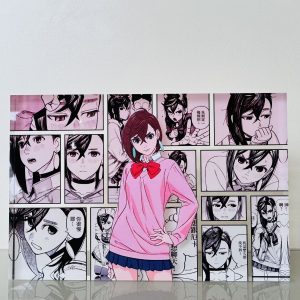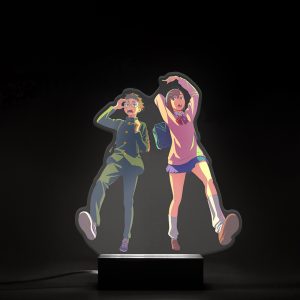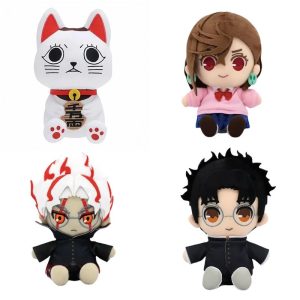
Dandadan is full of bizarre supernatural beings and emotionally complex characters, but one of its most heartfelt and haunting figures is Futa Zuma. Though his presence is tied to tragedy, Futa Zuma becomes a powerful yokai who plays a crucial role in the story. Known in the spiritual realm as Umbrella Boy, Futa’s transformation from a human child into a protective yokai adds a poignant layer to the manga’s already rich narrative.
In this article, we’ll explore the character of Futa Zuma—his background, design, personality, and symbolic importance within Dandadan.
Futa Zuma’s Human Life: A Childhood Shaped by Love and Loss
Before becoming a yokai, Futa Zuma was just a young boy growing up in difficult circumstances. Born into poverty, Futa cherished the few gifts he received from his mother—particularly a pair of rain boots and a trusty umbrella. These items became his most treasured possessions, a symbol of comfort and love in a life marked by hardship.
After the loss of their father, Futa’s older brother, Unji Zuma, stepped up as the family’s protector. Together, they faced a world that offered little kindness. On a rainy day, tragedy struck when Futa chased after his umbrella and drowned in a river. This moment would become the turning point in his existence—ending his human life and beginning his journey as a spirit.
The Yokai Transformation: Futa Zuma Becomes Umbrella Boy
Futa Zuma’s untimely death gave rise to one of Dandadan’s most visually memorable yokai: Umbrella Boy. His ghost took on a form inspired by classic Japanese folklore—specifically the Kasa-obake, a one-legged umbrella spirit with a single large eye.
As a yokai, Umbrella Boy retains traces of Futa Zuma’s essence. His design reflects both folklore and personal history: the missing boot he lost when he drowned explains why he now appears with only one leg and wears a geta sandal. Hidden behind a tattered umbrella, Umbrella Boy’s haunting figure carries both sorrow and strength.

Futa Zuma’s Personality: Sweetness Beneath the Surface
In life, Futa Zuma was a cheerful, innocent boy. His appreciation for simple things, like his mother’s gifts, showed a maturity beyond his years. That same spirit lives on in his yokai form. According to Turbo Granny, Umbrella Boy is a kind-hearted entity. He’s gentle by nature, but when the need arises—particularly in moments of crisis—he becomes an unstoppable force.
This duality makes Futa Zuma an intriguing figure. While many yokai in Dandadan are hostile or mischievous, Futa stands apart as a spirit who protects rather than harms. His actions are driven by love—especially for his brother.
Futa Zuma’s Reunion with Unji Zuma: Brotherhood Beyond Death
Years after his death, Futa Zuma reappears during a high-stakes rescue mission at the same river where he once drowned. Unji, rushing to save two children from being swept away, finds himself facing impossible odds. At that moment, Futa’s spirit intervenes. As Umbrella Boy, he grants Unji the power needed to save them—binding his own abilities to his older brother in a shared effort to protect others.
This reunion is deeply emotional. It not only reinforces the bond between the brothers but also shows that love can transcend death. Futa Zuma, even as a spirit, continues to watch over Unji, providing strength when it matters most.
Futa Zuma’s Symbolism: Tradition Meets Tragedy
Futa Zuma’s yokai form is inspired by the Kasa-obake, a well-known spirit in Japanese folklore often portrayed with one eye and one leg. Dandadan puts a unique spin on this creature by grounding it in personal tragedy. The missing leg isn’t just a folkloric detail—it’s a callback to the boot Futa lost while drowning. The umbrella, tattered and frayed, is the same one he loved in life.
This blend of cultural mythology and personal storytelling makes Futa Zuma stand out. He’s not just a folklore figure; he’s a narrative bridge between the past and the present, between memory and myth.
The Legacy of Futa Zuma in Dandadan
Futa Zuma isn’t just a one-off character—his presence echoes throughout Dandadan. His spirit embodies themes of grief, resilience, and unconditional love. As Umbrella Boy, he continues to fight alongside his brother, helping others in need and symbolizing the eternal bond between siblings.
His tragic story also highlights the dangers of poverty and neglect, subtly raising social themes within the manga. Yet, Futa’s enduring spirit and willingness to protect show that even those who pass on too soon can leave behind a lasting legacy.
Conclusion: Why Futa Zuma’s Story Resonates
Futa Zuma may have started as an ordinary boy, but his journey is anything but ordinary. From a humble child to a powerful yokai, his evolution in Dandadan is deeply emotional and thematically rich. His transformation into Umbrella Boy is not just a horror trope—it’s a symbol of enduring love and unbreakable family ties.
Whether you’re captivated by Japanese folklore or drawn to emotional character arcs, Futa Zuma is a character worth remembering. He reminds us that spirits aren’t always vengeful—and sometimes, they just want to keep their promises.
-
 Dandadan Acrylic Pins$9.00 – $22.00
Dandadan Acrylic Pins$9.00 – $22.00 -
 Dandadan Stickers 50 Pieces$9.90
Dandadan Stickers 50 Pieces$9.90 -
 Dandadan Momo Alien Earrings$10.00
Dandadan Momo Alien Earrings$10.00 -
 Dandadan Posters Set of 10$15.00
Dandadan Posters Set of 10$15.00 -
 Dandadan Okarun and Momo T-shirt$19.00
Dandadan Okarun and Momo T-shirt$19.00 -
 Dandadan Momo Ayase Acrylic Decor$22.00
Dandadan Momo Ayase Acrylic Decor$22.00 -
 Okarun Momo Turbo Granny Sweatshirt$24.00
Okarun Momo Turbo Granny Sweatshirt$24.00 -
 Dandadan Okarun Transformation Night Light$27.00
Dandadan Okarun Transformation Night Light$27.00 -
 Dandadan Okarun and Momo Night Light$27.00
Dandadan Okarun and Momo Night Light$27.00 -
 Turbo Granny Hair Dryer Figure$28.00
Turbo Granny Hair Dryer Figure$28.00 -
 Dandadan Plushes$28.00
Dandadan Plushes$28.00 -
 Okarun Turbo Granny Form Cosplay Costume$35.00 – $99.00
Okarun Turbo Granny Form Cosplay Costume$35.00 – $99.00
